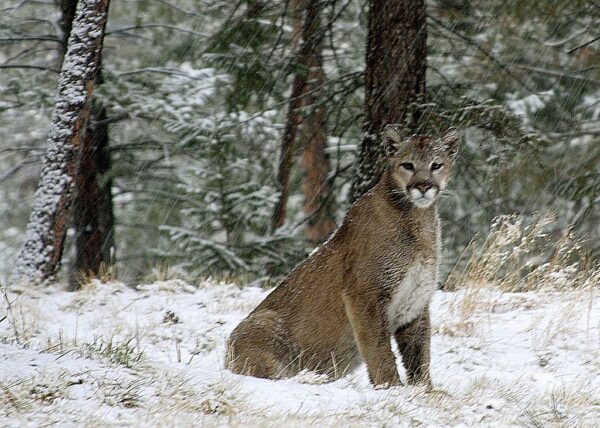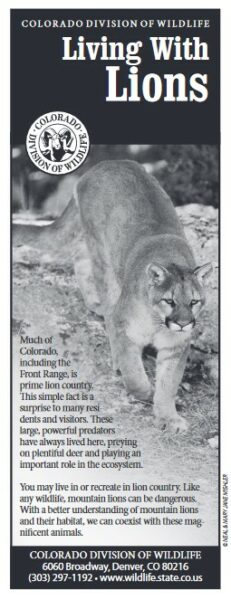Listen to this article
Mountain lions – also commonly referred to as cougar, puma, or panther – are Colorado’s biggest felines, weighing on average between 95 and 160 pounds. Colorado Parks and Wildlife estimates the state’s lion population at about 4,000 animals, located mainly in areas where their favorite food sources, deer and elk, are plentiful.

Historically, mountain lions were seen as a nuisance species in the state, with the reputation of being dangerous to humans and livestock. After decades of hunting reduced lion populations significantly, they were given protected status in Colorado in 1965. Today, lion hunting is still allowed but must follow state regulations.
While mountain lions tend to be elusive and solitary, interactions with humans are becoming more common due to increases in outdoor recreation and development of lions’ traditional habitats. According to Colorado Parks & Wildlife, there have been twenty-five mountain lion attacks on humans since 1990 – but four of these have occurred in the last two years, suggesting that they are becoming more common. So, what should you do if you encounter a mountain lion on the hiking trail, or in your backyard? Episode 4 of Colorado Parks & Wildlife’s new video series, Mountain Lions in Colorado, provides helpful tips, including:
- Make noise and make yourself look big and tough (hold out your arms, etc.)
- Don’t crouch down or hide
- Slowly back away – don’t run
- If you are attacked, fight back as best you can
- Carry bear spray or air horns as possible deterrents
- Keep close watch on your pets
- If you have a mountain home, don’t attract deer – because deer attract lions
- Report sightings to Colorado Parks & Wildlife
Each of these tips is explained in more detail in Episode 4. The other videos in the series explore mountain lion biology and management; human expansion into lion habitat; and hunting. The videos provide a fascinating look at this intriguing species.
 For more tips from CPW, see their “Living with Wildlife: Mountain Lions” website and Living with Lions brochure. CPW also offers a Mountain Lion Education & Identification Course; see their website for details.
For more tips from CPW, see their “Living with Wildlife: Mountain Lions” website and Living with Lions brochure. CPW also offers a Mountain Lion Education & Identification Course; see their website for details.
- How to Spot the Differences Between Eagles and Hawks - August 16, 2021
- How Transportation Projects Help Tell the Story of Colorado’s Past - August 9, 2021
- Time Machine Tuesday: The Night the Castlewood Canyon Dam Gave Way - August 3, 2021